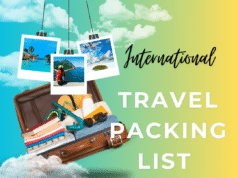The Unicaf Scholarship 2025 is a major opportunity for students worldwide to access internationally recognised higher education through generous partial or merit-based funding. Whether you’re interested in a Bachelor’s degree, a Master’s programme or a PhD, this scholarship can be a gateway to academic success, better career chances, and global mobility. This detailed guide explores every aspect: eligibility, cost, visa, culture, relocating, international job opportunities, digital nomad life, and more. You can also explore our guide on Borno State Scholarship 2025
Table of Contents
- What is the Unicaf Scholarship 2025?
- Key Features & Benefits of Unicaf Scholarships
- Eligibility Requirements & Who Can Apply
- How to Apply: Step-By-Step Guide for 2025
- Cost & Funding: What does Partial Funding Mean?
- Programmes & Fields Covered by Unicaf
- Visa Requirements & Study Abroad / Online Hybrid Options
- Relocation & Culture for International Students
- Digital Nomad Life & Work Opportunities Post-Scholarship
- FAQs about Unicaf Scholarship 2025
- Conclusion: Why the Unicaf Scholarship 2025 Could Be Your Springboard

What is the Unicaf Scholarship 2025?
Unicaf Scholarship 2025 is the latest round of the Unicaf Scholarship Programme, offering students from around the world access to partner university programmes with scholarships that reduce tuition costs significantly. These programmes are delivered online, in blended learning modes, or via partner campuses, depending on the degree and location. The scholarship covers Bachelor’s, Master’s, and Doctoral levels.
Unicaf works with several partner universities including Unicaf University (several campuses in Africa), University of Suffolk, Liverpool John Moores University, University of East London, among others.
Key Features & Benefits of Unicaf Scholarships
Flexibility & Online / Blended Study Modes
- Study from anywhere via online or blended learning, which suits students who may not relocate.
- No need to commute or travel constantly for campus-based programmes; study schedules can adapt to work/life routines.
Internationally Recognised Degrees & Accredited Partner Universities
- Degrees awarded via recognised universities are internationally accepted.
- With Unicaf University and its partners, quality assurance, accreditation, and recognition are standards.
Affordability & Generous Scholarship Support
- Unicaf Scholarship 2025 offers partial funding scholarships that vary in value depending on your programme, merit, and need.
- Significant savings on tuition make otherwise expensive international programmes much more accessible.
Support & Student Services
- Academic advising, study support, digital libraries, access to online learning environments.
- Student-friendly application process. Many reviews note ease of registering, submitting documents, continuing studies.
Eligibility Requirements & Who Can Apply
To be considered for Unicaf Scholarship 2025, applicants must typically meet the following criteria:
- Meet the entry academic requirements for the chosen programme (Bachelor, Master, or PhD). This includes prior transcripts or certificates.
- Be a citizen of any country; eligibility is open globally.
- Demonstrate ability to pay the portion of fees not covered by the scholarship. Scholarship is partial, so there is always some financial involvement.
- Provide required documents: proof of identity, academic transcripts, possibly proof of English proficiency if education language was not English.
- Some scholarships also consider financial need, merit, and country of residence.
How to Apply: Step-By-Step Guide for Unicaf Scholarship 2025
Here is a clear roadmap to submitting a strong application:
- Explore Available Programmes
Visit the Unicaf website to see what universities and degrees are offered in 2025. Choose one that matches your academic background & career goals. - Check Deadlines
Some external sources indicate specific deadlines for certain cohorts. For example, one listing shows July 31, 2025.
Make sure you’re applying in time. Missing deadlines means missing the opportunity. - Complete the Application Form
This is done online through the Unicaf Scholarship portal. Fill out personal information, programme choice, country of residence etc. - Gather Required Documents
- Academic transcripts or certificates
- Proof of identity (passport or national ID)
- Personal statement or essay, explaining your motivations and career goals
- CV / Resume
- English proficiency proof if required
- If requested: financial documentation to show need.
- Submit and Wait for Review
Application will be reviewed by Unicaf’s admissions / scholarship committee. They assess merit, financial need, and programme eligibility. - Receive Offer, Accept & Begin Studies
If accepted, you get a scholarship offer which you accept. Then you enrol in your chosen course. Courses may begin as online or blended per partner university policies.
Cost & Funding: What does Partial Funding Mean?
Understanding how much you’ll pay vs what is covered is essential for budgeting, visa, travel, and living costs.
What the Scholarship Covers
- The Unicaf Scholarship does not always cover 100% of tuition. It is typically partial funding; the remaining tuition must be paid by student.
- The amount of scholarship depends on academic merit, financial need and possibly region of residence.
Additional Costs to Plan For
- Tuition balance after scholarship
- Study materials: textbooks, online resources, software if needed
- Internet & hardware for online or blended learning
- Visa costs (if going to a campus abroad or attending graduation overseas)
- Living expenses if relocating: accommodation, food, transport, health insurance etc.
- Travel & relocation (one-time costs if moving to another country)
- Miscellaneous: cultural orientation, local fees, registration etc.
Estimating Total Budget for International Students
Here’s a sample breakdown (approximate, subject to country & programme):
| Expense | Estimated Cost (USD / local currency) |
| Tuition after scholarship | Varies widely (e.g. thousands USD) |
| Living costs (one year) | $5,000 to $20,000 depending on country / city |
| Visa application fees | $100-$500+ |
| Health insurance | $200-$1,000+ |
| Travel / relocation | $500-$2,500+ |
Use the partner country’s cost of living indices to make precise estimates. ABXPL.com has several articles on cost of studying abroad which may help you build your budget.
Programmes & Fields Covered by Unicaf Scholarship 2025
Unicaf Scholarship 2025 encompasses a wide variety of subject areas. Whether your interest is business, computer science, public health, education, law etc., there are options. Not all fields are open in every university partner or region, so check specifics.
Common Degree Programs You Can Study
- Business & Management: MBAs, General Management, Marketing, Oil & Gas & Energy Management etc.
- Public Health & Healthcare Management
- Education / Leadership in Education
- Law / LLM
- Computer Science, Information Security, Digital Technologies
- Humanities / Social Sciences: English literature, International Relations etc.
Visa Requirements & Study Abroad / Online Hybrid Options
For many applicants, visa processes and whether you need to relocate are very important.
Online & Blended Learning vs Full On-Campus
- Unicaf offers many online programmes and blended learning via partner universities. These modes often do not require relocation or visa if you study remotely.
- Some degrees may have on-campus components or require mandatory in-person residency / attendance, depending on partner university and your programme. Always check with the university.
Visa Guidance If Relocating
If you plan to relocate (e.g. to attend graduation, or a blended campus, or physically study some modules), these are typical steps:
- Research the student visa policies of the country where the partner university is located.
- Ensure your university and programme qualify for visa sponsorship. For example, University of Suffolk notes that online Unicaf students are registered with Suffolk and may have same certificate, but Graduate Route post-study visas in UK may not apply if the course was fully online.
- Gather documents: proof of admission, official scholarship offer, financial documents showing ability to cover costs not covered by scholarship, health insurance, accommodation arrangements etc.
- Apply before deadlines; many countries require visa interviews, proof of language proficiency, medical checks.
- Maintain immigration compliance during study (if visa issued), e.g. attend required in-person sessions, maintain full enrolment etc.
Relocation & Culture for International Students
Studying abroad (or even relocating temporarily) comes with challenges and enriching cultural exposure.
Adjusting to New Cultures & Environments
- Language: check the country’s main language of instruction and daily life. While your course may be in English, local living may involve other languages.
- Social norms: adapt to local customs, local food, climates, holidays. Be open, respectful and curious.
- Food, housing, transport: styles differ globally; budgeting and planning in advance help.
- Mental health & homesickness: keep in touch with family/friends, use student support services.
If Staying Online / as Digital Nomad
- You can live in your home country (or any country) while studying online. This can reduce costs, avoid visa hurdles, and allow you to travel or work part-time / freelance.
- Consider internet speed, power, space to work. These are essential for online learning.
- If being a digital nomad: time-zone management, coworking spaces, remote job opportunities, balancing travel with study deadlines.
Digital Nomad Life & International Job Opportunities Post-Scholarship
Combining Scholarship with Remote / Freelance Work
- Many Unicaf students already combine study with part-time work or freelancing. Because many programmes are online, you can arrange your schedule flexibly.
- Skills acquired (especially in business, data, public health, digital technologies, management) are often in demand remotely. Certifications from recognised universities boost credibility.
International Job Prospects
- Graduates from Unicaf’s partner universities can apply for local or international roles. A USA or UK degree (even if delivered online) is often recognised by employers.
- Some programmes are designed with industry relevance – in healthcare, public health, management etc. This helps with employability.
- Networking: via Unicaf alumni networks, partner university connections, online forums etc.
Post-Study Work Visa & Migration
- Some countries grant post-study work visas but often require you to have been physically present or meet specific rules. Fully online students may not qualify. For example, University of Suffolk’s Graduate Route in UK requires valid Student Route / Tier 4 visa and physical study.
- Always verify with immigration authorities in the country of the partner university.
Explore our guide on Best Travel Insurance For Digital Nomads Visa
FAQs about Unicaf Scholarship 2025
| Question | Answer |
| What is the deadline for Unicaf Scholarship 2025 applications? | Deadlines vary by programme and region. Some external sources list 31 July 2025. Others show rolling / ongoing applications for online programmes. |
| Is the scholarship fully funded? | No. The Unicaf Scholarship 2025 is generally partial funding. You will need to cover part of the fees and additional expenses. |
| Which countries are eligible? | Essentially all nationals globally are eligible. There is no country restriction in many announcements. |
| Do I need to relocate or apply for a visa if I study online? | Not necessarily. For fully online programmes, no visa or relocation is required. If your programme has in-campus or blended components, then visa/relocation may apply. |
| Will online degrees be recognized for jobs and postgraduate study? | Yes, degrees from partner universities are internationally recognised. Many students have used them for jobs or further studies. |
| Can I work while studying? | In many cases yes, especially with flexible online formats. If you relocate, visa rules will govern whether work is allowed. Always check the laws of the country involved. |
Visa Guidance & Budget Travel Tips for Unicaf Scholars
Visa Guidance
- If you need a visa, begin application as soon as you have your acceptance and scholarship offer.
- Ensure you have proof of finances, accommodation, valid passport, and sometimes letters from health or police clearance.
- Some countries require physical attendance to qualify for certain visas; verify with the university and embassy.
- For countries like the UK, USA, Australia: online programmes may not qualify for student visas or post-study work permits.
Budget Travel & Relocation Advice
- Travel off-peak for lower airfare. Use student travel discounts.
- Look for shared accommodation / student halls to cut housing cost.
- Use public transport or student passes.
- Plan meals, groceries: cooking is often cheaper than eating out.
Culture, Diversity & Student Experience
- Unicaf brings students from many countries, ethnicities, backgrounds: a diverse peer group. This enriches discussions, projects, and perspectives.
- Online platforms: forums, virtual classes, group work allow cross-cultural interaction.
- If studying physically or attending a partner campus/centre: you’ll encounter local culture, perhaps blend of local & international students. Great chance to learn, adapt.
- Be open-minded, respectful, proactive in cultural exchange.
Why Unicaf Scholarship 2025 Could Be Your Springboard
- Offers access to quality education at lower cost, reducing one of the biggest barriers.
- Helps you get credentials from internationally recognised universities; boosts employability.
- Flexible modes of study allow you to work, travel, live as a digital nomad, balancing study with life.
- Opens doors to international job markets, potentially post-study migration if permitted by rules.
- Empowers you to overcome financial, geographical obstacles you may otherwise face.
Internal Resources & Further Reading
If you’re looking for more guidance:
- Check ABXPL.com’s articles on budget travel while studying abroad and visa application guides to plan your journey.
- ABXPL.com also has success stories of international students using Unicaf and how they managed costs and relocation.
External Links for Reliable Information
- Official Unicaf Scholarships page: Unicaf Scholarship Programme
- University of Suffolk’s partnership with Unicaf: University of Suffolk Unicaf Partner
Conclusion: Unicaf Scholarship 2025 — Unlocking Global Potential
The Unicaf Scholarship 2025 stands out as one of the most accessible and flexible routes for students globally to pursue higher education, whether through online, blended, or campus-based learning. By providing partial funding, international recognition, flexible delivery, and strong support services, it reduces key barriers such as cost, geography, and access. If you have the ambition, qualify academically, and can manage the uncovered costs, this scholarship could be your springboard to personal growth, international job opportunities, and a transformative education. Don’t miss the chance—apply, plan, and set your path forward with Unicaf Scholarship 2025.







